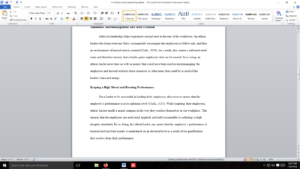Ethics and Leadership
Assignment 2 Ethics and Leadership (Due Week 3; 20 points)
The purpose of this assignment is to explore and critically present your views about ethics and its role in leadership.
Consider your views, experiences, and readings about ethics. In a paper (4-5 pages, excluding your title page and reference list), discuss the following:
- Definition of ethics. Support comments with three or more relevant references.
- Provide an overview about the role of and need for ethics in leadership.
- Identify the main ethical responsibilities in your professional field and position.
- Describe the main ethical challenges posed in your field of work, profession.
Rubric:
| Element | Not Met (3-0 points) | Met (4 points) | Exceeded (5 points) |
| Critically defines ethics and supports definition with references | Definition is unclear or missing. | Provides a definition of ethics and supports with 3 references | Provides a comprehensive and appropriately documented (3 or more references) definition of ethics |
| Describes the role and for ethics in leadership | Description about the role of ethics and need is unclear, vague, or not included | Describes the role of ethics and establishes its needs for effective leadership | Clearly describes the role of ethics and establishes its needs for effective leadership |
| Identifies key ethical responsibilities and main challenges in own field | Main ethical responsibilities and challenges faced by leadership in their field/profession is unclear, vague, or not provided. | Identifies the main ethical responsibilities and challenges faced by leadership in their field/profession | Clearly identifies the main ethical responsibilities and challenges faced by leadership in their field/profession. Implications are described and examples provided. |
| Follows APA format and uses documentation | Paper does not adhere to the APA guidelines. There are multiple errors. | Paper adheres to the APA guidelines. There are some minor errors (5 or 4) | Paper clearly adheres to the APA guidelines. There are minimal (3 or less) errors or none. Errors are negligible. |
| Total: 20 points |
Requirements: 4-5 pages
Answer preview
Ethics in leadership helps to promote mutual trust to the rest of the workforce. An ethical leader who treats everyone fairly consequently encourages the employees to follow suit, and thus an environment of mutual trust is created (Ciulla, 2020). As a result, this creates a self-motivated team and therefore ensures that a leader gains employees that can be trusted. In so doing, an ethical leader saves time as well as money that could have been used in micromanaging the employees and instead redirects these resources to other areas that could be in need of the leader’s time and energy.
Keeping a High Moral and Boosting Performance
For a leader to be successful in leading their employees, they need to ensure that the employee’s performance is at its optimum level (Ciulla, 2020). While inspiring their employees, ethical leaders instill a moral compass in the way they conduct themselves in the workplace. This ensures that the employees are motivated, inspired, and held accountable by adhering to high integrity standards. By so doing, the ethical leader can ensure that the employee’s performance is boosted and that their morale is maintained on an elevated level as a result of the gratification they receive from their performance.
[1513 Words]

Ethics and Leadership

